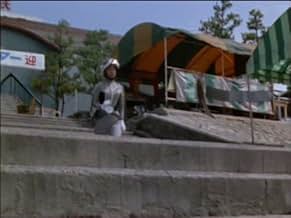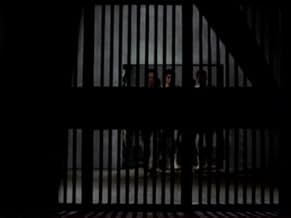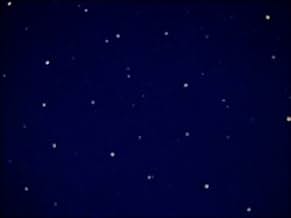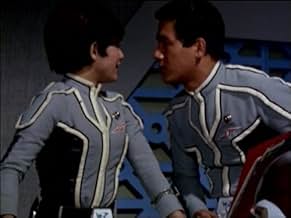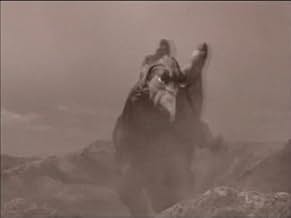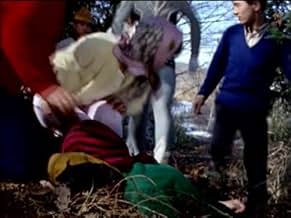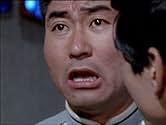AVALIAÇÃO DA IMDb
8,2/10
586
SUA AVALIAÇÃO
Um super-herói extraterrestre M-78 protege à Terra das ameaças extraterrestres.Um super-herói extraterrestre M-78 protege à Terra das ameaças extraterrestres.Um super-herói extraterrestre M-78 protege à Terra das ameaças extraterrestres.
Explorar episódios
Avaliações em destaque
My favorite of the ultra series so far, ultraseven is slowly becoming my favorite super hero, this show is so entertaining and my favorite episode has to be the last one I think, I recommend you watch every episode if you haven't already, I dont think there is a single bad one.
I watched it when I was a kid many years ago. The best show of the ultra family.It was a disappointed when TNT aired a chopped version of the series. The effects were great for that time.It was so good that the studios made some special movies until a few years ago. If you watch Ultra Seven or any of the Japanese fiction series (like Johnny Sooko and his giant robot,Ultraman, The MJ, etc.), you will see how the Power Rangers is a cheap copy of the pioneer work of the Japanese studios. I wish the series will came available on DVD for the USA market, uncut with all the episodes (one episode was deleted of the official line up). I know there are a legion of fans of this genre.
10Ryuusei
If I was asked who my favorite superhero was, along with Spider-Man, the Hulk and the Incredibles, it'd be Ultra Seven.
We know ULTRA Q and ULTRAMAN (both 1966) are tokusatsu sci-fi TV classics in Japan, but the very peak of Tsuburaya Productions' famed Ultra Series was reached with ULTRA SEVEN, which Japanese fans have, to this day, hailed as the all-time best Ultra Series, and for good reason! It is basically the JAPAN of Japan (long before shows like SPACE BATTLESHIP YAMATO/STAR BLAZERS). Even underneath the wild battles between the red & silver alien from M78 and his alien foes, this is a very serious and thought-provoking sci-fi drama. Especially in the human scenes, with our protagonists, the Ultra Garrison. This is a very different series from its aforementioned two predecessors. Later Ultra Series like ULTRAMAN TIGA and the more grown-up ULTRAMAN NEXUS would duplicate this formula.
Seven himself is different from Ultraman (who is a mysterious godlike being), as he's become the greatest archetype for the high-tech Japanese superhero. His powers/weapons are incredible (who *doesn't* love his flying boomerang-like Eyeslugger weapon?)! But underneath his cool exterior, he has even more heart, personality and depth than his famous predecessor. And the transformation from Dan Moroboshi (Kouji Moritsugu) to Ultra Seven, each time he puts on the "Ultra Eye" glasses, is without a doubt my favorite Japanese superhero transformation ever. I would also say that Ultra Seven is technically more like Japan's answer to Superman than Ultraman (who is more like the Green Lantern), only "Clark Kent" *puts on* his glasses to become Superman!
The Ultra Garrison's not half-bad either. Very different from the Science Patrol from Ultraman. The team uniforms (helmets, jumpsuits and rayguns) are memorable, so much that they have become pretty much the template for the defense forces in all future Ultra Series (and few of the series would copy them closely, like the 1979 anime series THE ULTRAMAN). And the mecha is awesome. I really love the Ultra Hawk, which splits into three different jet vehicles (ULTRAMAN DYNA had something like this, too)! Of course, just like in ULTRAMAN, the team members have similar personalities, but Dan Moroboshi (Seven's human alter-ego) is a different person from ULTRAMAN's Hayata. He's still a tough member, but he's also very considerate. And even in human form, he's well equipped to fight alien invaders, from having X-ray vision/telepathy to being equipped with miniature "Capsule Monsters" (Windom, Miclas and Agira), which are like tiny capsules that, when thrown like a grenade, explode and transform into giant monsters (and Dan can call it back into a capsule any time). I wonder which two anime series did *this* later on . . .
The music score and theme song, composed by the great Tooru Fuyuki (who would compose for many future Ultra Series and other Tsuburaya shows) are absolute classic, and one of the best soundtracks ever. Quite a different case from Kunio Miyauchi's jazzy score for ULTRAMAN, Fuyuki's orchestral score for this series evokes more power, ranging from neo-classical to avant-garde. The "Song of Ultra Seven" theme song is one of the best superhero theme songs ever. In a way, this score recalls Barry Gray's famous music for many of Gerry & Sylvia Anderson's "Supermarionation" shows (like THUNDERBIRDS and CAPTAIN SCARLET).
And, of course, there's the bizarre and imaginative alien & space monster threats! Some of my favorites include Eleking (a fan-favorite), Dankan, the Guts-Seijin and Seven's final foe, Pandon.
Sadly, this was also the final Ultra Series by creator Eiji Tsuburaya, who originally wanted this to be the final Ultra Series. (And the heart-rending farewell finale couldn't have emphasized it more!) Due to this series' unbelievable popularity, a new Ultra Series was planned in late 1969 (ULTRAMAN CONTINUES), but Eiji died (in 1970) before production began. The said project later became RETURN OF ULTRAMAN in 1971, when Eiji's first son Hajime Tsuburaya took over the studio (until his untimely death in 1973). But needless to say, Seven himself (and his alter-ego Dan) continues to make appearances in future Ultra Series, and due to fan response, got some TV specials and direct-to-DVD series.
This series was originally seen in the US in Hawaii in 1975 (the dub of which is now lost, but two episodes still remain), and on TNT in 1994 (from a somewhat comically-dubbed 1985 dub by Cinar in Canada), but ULTRA SEVEN is a series that truly deserves the same revisiting as ULTRAMAN in the US. If fans of Japanese pop-culture know what's good for them, they must watch ULTRA SEVEN! Disregarding it is like sci-fi fans disregarding, say, STAR TREK or DOCTOR WHO.
No more words need to be said, ULTRA SEVEN is a true Japanese sci-fi classic. But to quote LeVar Burton, "You don't have to take my word for it."
We know ULTRA Q and ULTRAMAN (both 1966) are tokusatsu sci-fi TV classics in Japan, but the very peak of Tsuburaya Productions' famed Ultra Series was reached with ULTRA SEVEN, which Japanese fans have, to this day, hailed as the all-time best Ultra Series, and for good reason! It is basically the JAPAN of Japan (long before shows like SPACE BATTLESHIP YAMATO/STAR BLAZERS). Even underneath the wild battles between the red & silver alien from M78 and his alien foes, this is a very serious and thought-provoking sci-fi drama. Especially in the human scenes, with our protagonists, the Ultra Garrison. This is a very different series from its aforementioned two predecessors. Later Ultra Series like ULTRAMAN TIGA and the more grown-up ULTRAMAN NEXUS would duplicate this formula.
Seven himself is different from Ultraman (who is a mysterious godlike being), as he's become the greatest archetype for the high-tech Japanese superhero. His powers/weapons are incredible (who *doesn't* love his flying boomerang-like Eyeslugger weapon?)! But underneath his cool exterior, he has even more heart, personality and depth than his famous predecessor. And the transformation from Dan Moroboshi (Kouji Moritsugu) to Ultra Seven, each time he puts on the "Ultra Eye" glasses, is without a doubt my favorite Japanese superhero transformation ever. I would also say that Ultra Seven is technically more like Japan's answer to Superman than Ultraman (who is more like the Green Lantern), only "Clark Kent" *puts on* his glasses to become Superman!
The Ultra Garrison's not half-bad either. Very different from the Science Patrol from Ultraman. The team uniforms (helmets, jumpsuits and rayguns) are memorable, so much that they have become pretty much the template for the defense forces in all future Ultra Series (and few of the series would copy them closely, like the 1979 anime series THE ULTRAMAN). And the mecha is awesome. I really love the Ultra Hawk, which splits into three different jet vehicles (ULTRAMAN DYNA had something like this, too)! Of course, just like in ULTRAMAN, the team members have similar personalities, but Dan Moroboshi (Seven's human alter-ego) is a different person from ULTRAMAN's Hayata. He's still a tough member, but he's also very considerate. And even in human form, he's well equipped to fight alien invaders, from having X-ray vision/telepathy to being equipped with miniature "Capsule Monsters" (Windom, Miclas and Agira), which are like tiny capsules that, when thrown like a grenade, explode and transform into giant monsters (and Dan can call it back into a capsule any time). I wonder which two anime series did *this* later on . . .
The music score and theme song, composed by the great Tooru Fuyuki (who would compose for many future Ultra Series and other Tsuburaya shows) are absolute classic, and one of the best soundtracks ever. Quite a different case from Kunio Miyauchi's jazzy score for ULTRAMAN, Fuyuki's orchestral score for this series evokes more power, ranging from neo-classical to avant-garde. The "Song of Ultra Seven" theme song is one of the best superhero theme songs ever. In a way, this score recalls Barry Gray's famous music for many of Gerry & Sylvia Anderson's "Supermarionation" shows (like THUNDERBIRDS and CAPTAIN SCARLET).
And, of course, there's the bizarre and imaginative alien & space monster threats! Some of my favorites include Eleking (a fan-favorite), Dankan, the Guts-Seijin and Seven's final foe, Pandon.
Sadly, this was also the final Ultra Series by creator Eiji Tsuburaya, who originally wanted this to be the final Ultra Series. (And the heart-rending farewell finale couldn't have emphasized it more!) Due to this series' unbelievable popularity, a new Ultra Series was planned in late 1969 (ULTRAMAN CONTINUES), but Eiji died (in 1970) before production began. The said project later became RETURN OF ULTRAMAN in 1971, when Eiji's first son Hajime Tsuburaya took over the studio (until his untimely death in 1973). But needless to say, Seven himself (and his alter-ego Dan) continues to make appearances in future Ultra Series, and due to fan response, got some TV specials and direct-to-DVD series.
This series was originally seen in the US in Hawaii in 1975 (the dub of which is now lost, but two episodes still remain), and on TNT in 1994 (from a somewhat comically-dubbed 1985 dub by Cinar in Canada), but ULTRA SEVEN is a series that truly deserves the same revisiting as ULTRAMAN in the US. If fans of Japanese pop-culture know what's good for them, they must watch ULTRA SEVEN! Disregarding it is like sci-fi fans disregarding, say, STAR TREK or DOCTOR WHO.
No more words need to be said, ULTRA SEVEN is a true Japanese sci-fi classic. But to quote LeVar Burton, "You don't have to take my word for it."
As the third entry to this huge franchise, it turns out to be much better than I expected. While it's still has the same formula as before, "huge bad guys versus good guys" or "monster of the week" formula to be exact, Ultraseven tries to be different from it's previous entries as the tone for this one are much darker and the mood also seems to became more serious than before. The gore also appears pretty frequently too.
Although the beginning of the show seems to be really weak and lazy in it's first 3 episodes, it starts to became progressively better as soon as the show goes on. Each of the episodes has it's unique plot, another reason why I like early Showa Ultraman era so much. Some of the episodes has different filmmaking style that feels like you're watching a different show (ex. Episode: The Untargeted Town). Anyways, I like that Tsuburaya spices something new and unique, and it works magically.
Talking about the conclusion to the show. The finale is simply monumental and incredible, not only because it is better than that 1965 Ultraman ending, it's because you can feel what happen to the characters and Ultraseven. You can feel the threat given by the monsters. The score in the finale, even though the composer did not made it due to ran out of time, adds that feeling that you'll never get it again in any of Ultraman shows.
Overall, this is one of the best Showa Ultraman shows out there. Go watch it, it will subvert your expectations.
Although the beginning of the show seems to be really weak and lazy in it's first 3 episodes, it starts to became progressively better as soon as the show goes on. Each of the episodes has it's unique plot, another reason why I like early Showa Ultraman era so much. Some of the episodes has different filmmaking style that feels like you're watching a different show (ex. Episode: The Untargeted Town). Anyways, I like that Tsuburaya spices something new and unique, and it works magically.
Talking about the conclusion to the show. The finale is simply monumental and incredible, not only because it is better than that 1965 Ultraman ending, it's because you can feel what happen to the characters and Ultraseven. You can feel the threat given by the monsters. The score in the finale, even though the composer did not made it due to ran out of time, adds that feeling that you'll never get it again in any of Ultraman shows.
Overall, this is one of the best Showa Ultraman shows out there. Go watch it, it will subvert your expectations.
10dee.reid
"Ultra Seven" appears to be the overall best entry in the entire "Ultra" series, which began with "Ultra Q" and achieved massive popularity with "Ultraman." Fan coverage seems to confirm the belief that the third entry in the series, "Ultra Seven," is indeed the best. The stories often focused a lot more on characters and story than previous entries did; they also probed a number of social and ethical issues relevant to contemporary society - not just Japanese society but everywhere, with the overall intent being an introspective examination of who/what we are as a species. The entire "Ultra" series focused on the adventures of alien superheroes saving Earth from all threats, terrestrial and extraterrestrial. This incarnation finds the intergalactic space traveler Ultra Seven assuming the form of an injured mountain climber, and thus becomes the human Dan Moroboshi (Koji Moritsugu), the honorary seventh member of the Terrestrial Defense Force (TDF), which protects Earth from all forms of extraterrestrial menace (and whose ranks include two cast members from "Ultraman"). The focus of any of the various "Ultra" films were the creative kaiju/daikaiju monster designs and showdowns, courtesy of Eiji Tsuburaya (1901-1970) and his company Tsuburaya Productions (which was also behind the hugely popular Showa-era "Godzilla" film series).
Ultra Seven is now my second-favorite Japanese superhero, behind The Guyver.
10/10
Ultra Seven is now my second-favorite Japanese superhero, behind The Guyver.
10/10
Você sabia?
- CuriosidadesConsidered by Japanese fans to be not only the most popular entry of the Ultra Series, but also one of Japan's greatest sci-fi/superhero TV shows. Due to his huge popularity, the character of Ultra Seven (as well as his alter-ego, Dan Moroboshi, played by Kôji Moritsugu) has appeared in more sequels and spin-offs than any other character in the Ultra Series.
- Cenas durante ou pós-créditosThis was the first English-dubbed Japanese TV series in Hawaii (in 1975). Produced by Tsuburaya's Hawaii branch, it was dubbed by the Commercial Recording Company in Honolulu, and the voice talent consisted of several students from the Speech Department of the University of Hawaii.
- Versões alternativasIn current Japanese verisons, Episode 12 "Yûsei Yori Ai wo Komete" ("From Another Planet with Love") has been banned since 1970, because the episode offended irradiated survivors of Hiroshima and Nagasaki. The episode featured the Spehl Aliens, whose planet was destroyed by radiation, so they come to Earth to extract fresh blood from humans to restore their bodies. The episode was directed by Akio Jissoji, written by Mamoru Sasaki and guest starred Hiroko Sakurai (who played Yuriko Edogawa in "Ultra Q" and Akiko Fuji in "Ultraman"). However, the Hawaiian English version included the episode, as did TPS/Cinar's Canadian English dub, under the title "Crystalized Corpuscles."
- ConexõesFeatured in Space Ghost de Costa à Costa: $20.01 (1996)
- Trilhas sonorasUrutora Sebun no Uta
("The Song of Ultra Seven")
Main Title Theme
Music Composed and Arranged by Toru Fuyuki
Lyrics by Kyôichi Azuma (pseudonym for Hajime Tsuburaya)
Sung by The Echoes & the Misuzu Childrens' Choir
Principais escolhas
Faça login para avaliar e ver a lista de recomendações personalizadas
- How many seasons does Ultraseven have?Fornecido pela Alexa
Detalhes
Contribua para esta página
Sugerir uma alteração ou adicionar conteúdo ausente



